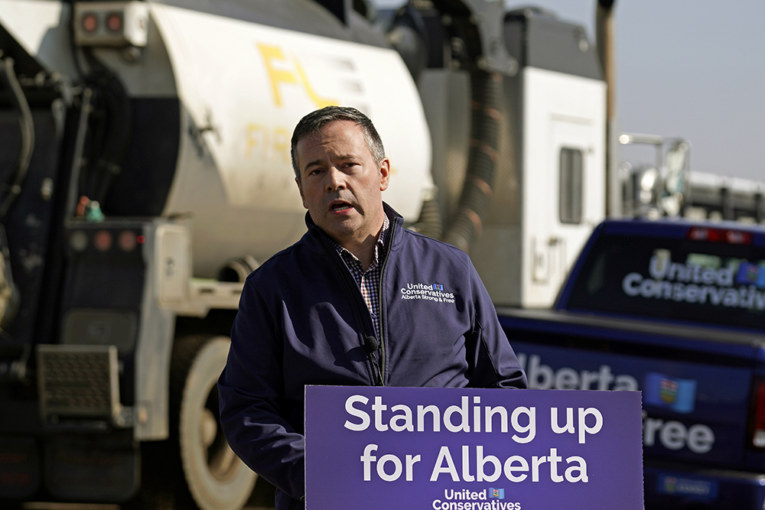
Who should voters blame for the failure to get pipelines built to move oil out of Alberta?
The provincial election campaign was dominated by the province’s pipeline quandary on Friday, with more verbal punches thrown between the political rivals than at an MMA event.
United Conservative Party Leader Jason Kenney and the NDP’s Rachel Notley did a pretty good job Friday of blaming each other for not getting energy infrastructure completed during their stints in federal and provincial politics.
“Rachel Notley and the NDP sold Alberta out to Justin Trudeau and all we got in return is no pipelines, a carbon tax and a jobs crisis,” Kenney said Friday, standing outside the Trans Mountain pipeline terminal in Edmonton.
In Calgary, the NDP leader had her own line of attack.
“Mr. Kenney spends a lot of time pointing fingers on pipelines, but I would say he should probably turn that finger around and point it right at himself,” Notley said of the former federal minister in the Harper government.
“He sat in cabinet for 10 years and he did nothing.”
It all makes for grand political theatre.
Meanwhile, the Trans Mountain expansion, Enbridge’s Line 3 development and the Keystone XL pipeline are all stuck in the mud.
One of the projects is needed quickly to unclog a congested oil-transportation system in western Canada.
All three have been delayed by regulatory rulings and legal decisions in Canada and the United States.
Not one will be operational within the next 12 months.
Related
While Notley was blasting the UCP leader and talking about Calgary flood mitigation, Kenney devoted his announcement to laying out a “fight back” strategy that would see him go after foreign funding of anti-oilsands groups.
Parts of his 12-point plan have been mentioned before, although there were some new details.
If elected, the UCP would initially set aside $2.5 million and launch a public inquiry into the foreign sources of funding that have streamed into environmental groups dedicated to thwarting the oilsands sector.
Alberta would also establish a $10-million litigation fund to back pro-development First Nations if they head to court over major energy developments.
This would be useful for proponents hoping to build the Eagle Spirit Energy pipeline proposal, allowing them to battle the Trudeau government’s oil tanker moratorium off B.C.’s northern coast.
Many of the promises are red meat for an angry province, such as the pledge to set up a war room to fight on social media with anti-oilsands activists and respond to “lies and myths told about Alberta’s energy industry.”
It seems like there’s already plenty of people willing to do that for free.
“I would much rather be accused of being aggressive in the defence of our vital economic interests, than apologizing for Alberta, as the premier has done, calling us the embarrassing cousins,” Kenney replied.
Other parties also joined the pipeline fray on Friday.
Freedom Conservative Party Leader Derek Fildebrandt came up with his own aggressive pitch to make progress on pipelines, saying he would look at imposing “environmental and pine beetle inspections on all B.C. lumber coming through our province.”
Inside Alberta podcast
In this edition of Inside Alberta, Don Braid and Chris Varcoe discuss polls, the “kamikaze candidate” and the importance of trust in an election campaign that promises to be the most divisive in recent memory.
Forget about a wine ban.
Here comes the beetle blockade, ready to join Alberta’s rat patrol.
Alberta Liberal Party Leader David Khan, whose federal counterparts will soon decide the fate of Trans Mountain, demanded the provincial NDP and Trudeau governments provide Albertans with an update on the TMX development.
(As the provincial Liberal leader, can’t he call up federal Natural Resources Minister Amarjeet Sohi, who lives in Edmonton, to get an answer?)
“TMX will not be built by attacking Ottawa, banning B.C. wine, threatening to shut off oil exports, and firing up a so-called ‘war room’ to battle the feds,” Kahn said. “Frankly, those ideas are just plain stupid.”
The dilemma for all political leaders is Alberta has limited powers to resolve the pipeline problem quickly.
Approving Trans Mountain rests with the Trudeau cabinet. The federal government is re-completing Indigenous consultations on the development that it bungled earlier in the process.
Keystone XL and the Line 3 replacement project were delayed recently in the U.S., meaning the Alberta government has no leverage to propel it forward.
But all of the talk makes for good politics.
An Angus Reid Institute poll released Friday shows energy, including pipelines, ranks as the most pressing issue among Albertans. (Nearly half identified it as the issue they care most about.)
And the survey found 64 per cent of Albertans believe the NDP government is doing a poor job of managing natural resources. (The online poll of 812 Albertans was conducted between March 11-18.)
While Notley has made some progress increasing national support for the Trans Mountain project, the incumbent doesn’t have a pipeline under construction and will have to play defence on the matter.
For oilpatch executives, they know the issues at play only too well.
They are less worried about the blame game, and more concerned about seeing solutions.
“The pipeline problem we have, has been a decade in the making, and every political party shares the blame for the mess we have been in,” said Chris Slubicki, CEO of Modern Resources and a vocal advocate on the pipeline front.
“There are no easy answers.”
Chris Varcoe is a Calgary Herald columnist.
You can read more of the news on source
